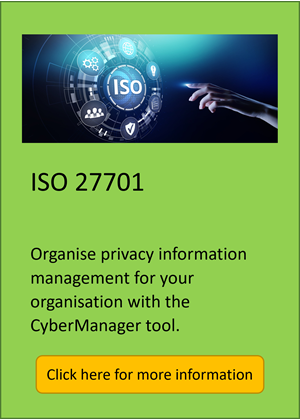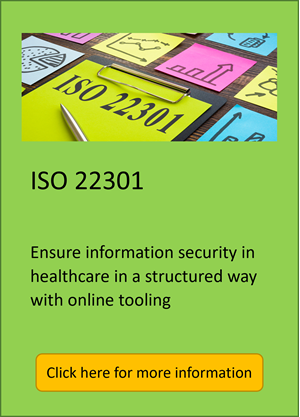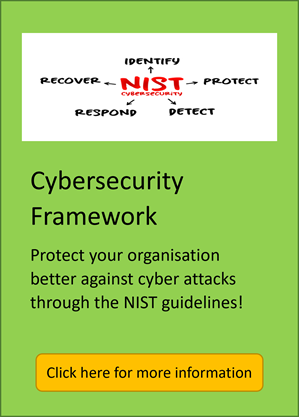ISO 27001 - Information security
ISO 27001: Ensuring Information Security in a Digital World
In our modern, digital society, information is an invaluable resource for organizations. It is therefore crucial that this information is protected from threats such as hackers, data breaches and unauthorized access. This is where ISO 27001, the international standard for information security, comes in. In this blog, we will take a closer look at ISO 27001 and its benefits for organizations.
The Essence of ISO 27001: ISO 27001 is an internationally recognized standard that helps organizations implement effective measures and standards requirements related to availability, confidentiality, and integrity of information security. With the advent of the General Data Protection Regulation (GDPR), companies are increasingly required to handle confidential information in a secure and reliable manner. ISO 27001 provides a structured approach to meeting these requirements and minimizing the risk of breaches.
An ISO 27001 certification allows organizations to demonstrate that they have the required processes and procedures in place and are serious about handling confidential information from stakeholders, suppliers, and customers. However, achieving this certification requires thorough preparation and implementation of appropriate security measures.
The standard itself contains standards requirements related to information security, but also an important annex called Annex A. This annex contains specific management measures that are further detailed in ISO 27002. Compliance with these measures contributes to the continuous improvement of corporate security and helps build a trustworthy image with both potential and existing customers.
The Certification Process: After the successful implementation of the required security measures and processes, an organization can obtain the ISO 27001 certificate. This certificate has a validity period of three years, with annual surveillance audits carried out to verify that all requirements are still being met. These regular audits ensure that organizations remain constantly vigilant and maintain the highest standards of information security.
The Benefits of ISO 27001: Implementing ISO 27001 and achieving certification provides significant benefits for organizations. First, it increases information security, reducing the risk of data breaches, data theft, and reputational damage. This, in turn, helps strengthen the trust of customers, partners, and other stakeholders. Being able to demonstrate that an organization complies with international information security standards and best practices is valuable proof of reliability and professionalism.
Another benefit of ISO 27001 is that it helps ensure compliance with laws and regulations, such as the AVG. By complying with the standard requirements and management measures of ISO 27001, organizations can ensure that they meet legal obligations regarding data protection and privacy. This helps avoid fines, legal disputes, and reputational damage that can arise from non-compliance.
In addition, ISO 27001 encourages a culture of continuous improvement within the organization. The certification process requires regular reviews, audits and revisions of information security measures. This ensures that organizations constantly stay abreast of new threats, technological developments, and industry best practices. This continuous improvement keeps the organization resilient and well-equipped to respond to new and evolving threats.
ISO 27001 certification also has positive effects on an organization's internal efficiency and productivity. Implementing standardized information security processes and procedures ensures a streamlined and consistent approach across the organization. This leads to improved operational efficiency and increased productivity as employees follow clear guidelines and best practices when handling confidential information.
Moreover, ISO 27001 certification can also strengthen an organization's competitive position. More and more customers and partners are placing high demands on the information security of the organizations they work with. Being able to demonstrate compliance with international standards sets an organization apart from competitors and increases trust among potential customers and partners.
Another aspect of ISO 27001 is the awareness of information security within the organization. Implementing the standard requires employees to be trained in information security and made aware of their responsibilities. This ensures a culture of information security in which all employees play an active role in ensuring the confidentiality, integrity, and availability of information.
Finally, achieving ISO 27001 certification can also lead to long-term cost efficiencies. Although initial implementation and certification require effort and investment, the long-term benefits can justify the costs. Reducing the risk of breaches, data loss and reputational damage can result in significant cost savings. Moreover, a streamlined approach to information security can lead to more efficient use of resources and minimize potential damage in the event of incidents.
ISO 27001 is an essential standard for organizations that value information security and minimizing risk. Implementing ISO 27001 offers significant benefits, such as strengthening customer confidence, ensuring compliance with laws and regulations, fostering a culture of continuous improvement, improving internal efficiency and productivity, enhancing competitiveness, and achieving long-term cost efficiency. In short, ISO 27001 provides a solid framework for organizations to ensure information security effectively and reliably to meet the increasingly stringent requirements of the digital world.
CyberManager is suitable for all common standards, certification schemes and assessment guidelines

Want to know more about the ISMS Management System?
Click here for more information!
We are happy to get in touch.
Mail to: sales@irm360.nl or fill in the contact form.




